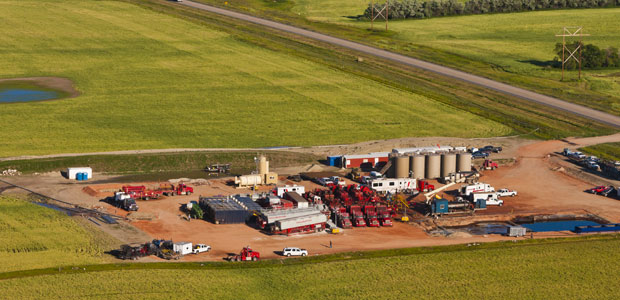
States Focusing On Water Usage Rights Issues
By Kenneth M. Klemm and Tyler L. Weidlich
NEW ORLEANS–Hydraulic fracturing has spurred a boom in domestic oil and natural gas exploration and production, and is breathing new life into many economically depressed areas. However, water issues continue to be at the forefront of public discussions on fracturing. While water quality concerns seemingly dominate the public forum–specifically, potential impacts on drinking water and freshwater supplies–an equally significant issue developing for the oil and gas industry involves the impact of fracturing on competing rights to use water resources.
The primary focus of the controversy centers on the significant quantities of water required for fracturing.
The number of wells that utilize hydraulic fracturing is expected to continue expanding over at least the next two decades, given the vast oil and gas reserves in unconventional resource plays. But at the same time, the country’s overall water demands also continue to rise, placing a strain on regions that have limited water resources, as well as areas prone to drought or faced with competing demands from not only the public, but other industries such as agriculture.
The confluence of rising demand and supply limitations make managing water supplies a key battleground in the debate over hydraulic fracturing. Water rights and questions of acquisition and control historically have fallen under the province of state and local laws, which is not surprising, given that each state and locality faces its own unique challenges when it comes to water resources. A number of states already regulate water rights and usage related to oil and gas operations, including hydraulic fracturing.
In terms of general regulatory trends, there is a movement toward requiring operators to disclose the source of water used, the amount withdrawn, the amount ultimately used in an operation, and any amount of flow back or produced water recovered after a frac job.
The oil and gas industry also continues to pursue measures to minimize water consumption, such as using water and brine solutions on the front end or recovering and reusing flow back. If such technologies continue to take hold, they may present their own political and legal risks, including but not limited to more traditional concerns over contamination and water quality.
Drilling a typical shale well reportedly requires anywhere between 65,000 and 600,000 gallons of water, while hydraulic fracturing can require between 5 million and 10 million gallons of water or more, depending on the shale play. Nevertheless, hydraulic fracturing accounts for less than 0.5 percent of the country’s overall water usage, and less than 2.0 percent of industrial water usage. Fracturing trails both farming and residential-purpose water withdrawals.
However, controversy arises because water impacts are localized, and hydraulic fracturing operations occur (and are expanding) in some of the country’s most arid and drought-stricken regions, including states such as North Dakota, Colorado, California and portions of Texas. In some areas, the impacts of fracturing on already scare water resources is cited as a potential reason for delaying permitting or approval of new wells, conducting further study of the impacts, or even banning fracturing altogether.
Regulatory Doctrines
Laws and regulations vary dramatically, depending on the region, including the availability of and demand for water resources, population density and topography, as well as the characteristics of prospective shale plays. Despite such differences, commonalities exist across state legislative and regulatory schemes.
States deal with procuring water for fracturing the same way they deal with water rights and allocation issues in general, whether by way of the riparian doctrine, the doctrine of prior appropriation, a mixed system, or otherwise. While some form of riparianism tends to dominate the historically water-rich states east of the Mississippi River, more arid states to the west tend to adhere to the doctrine of prior appropriation.
Common law riparianism allows all landowners adjacent to a body of surface water to make “reasonable use” of the resources, a concept based on the principle that surface waters are a communal, public resource. With some exceptions, allocating groundwater tends to be governed by the same or similar principles. The concern with fracturing in certain riparian states centers on the amount of water used by operators and whether those downstream will be able to procure adequate amounts from the same body of surface water.
As a result, riparian states such as Pennsylvania have begun to restrict water consumption related to oil and gas operations during times of drought and low water levels, and in fact, on occasion have even temporarily suspended such allocations. In addition, industry-specific legislation passed in 2012 requires Pennsylvania operators who use significant quantities of water for unconventional gas formations to provide water management plans that disclose the source of water used and an estimate of the anticipated maximum rate of withdrawal, together with a monitoring plan, a method of computation for low-flow analysis, and a withdrawal impacts analysis.
Pennsylvania’s new legislation concerning water management represents only a fraction of the state’s evolving statutory response to expanding oil and gas operations, and is fairly typical of the response of many riparian states. In fact, most Eastern states have adopted a form of “regulated riparianism,” whereby a state agency regulates water allocations through administrative permits. The permit system may control the time, location and quantity of a proposed water allocation as well as the method and purpose of the proposed withdrawals.
Anticipating Development
Regulations specific to the oil and gas industry continue to be promulgated in other states experiencing or merely anticipating significant shale development, largely in response to fracturing. In late 2011, West Virginia passed its Natural Gas Horizontal Well Control Act, establishing a comprehensive permitting system for horizontal gas wells. The law generally applies to horizontally drilled natural gas wells that disturb three acres or more, or use more than 210,000 gallons of water. And, similar to Pennsylvania, West Virginia requires operators to submit a water management plan to obtain a permit.
New York also has passed legislation requiring a permit for industrial withdrawals of more than 100,000 gallons of water a day, and an application for a permit must be supported by a detailed engineer’s report and water conservation plan. Notably, while much of New York apparently rests on Marcellus Shale natural gas reserves, drilling operations hang in limbo, pending a years-long study of the environmental impacts of hydraulic fracturing. New York’s legislation concerning water withdrawal permits, in fact, is purely anticipatory, and is characteristic of a general shift in the country’s riparian jurisdictions toward more regulations restricting water quantity, source and withdrawal rates.
Finally, and in contrast to the many riparian jurisdictions of states in the East, states in the western United States adhere to the “prior appropriation” doctrine that tends to treat water usage and allocation more as a property right. Under prior appropriation, the first party to use water for a beneficial purpose creates a property right in the water, provided the right is registered and recognized by the state. Most domestic, agricultural and industrial activities are considered beneficial uses for prior appropriation, and the property right can be conveyed, mortgaged and encumbered.
Prior Appropriation
In contrast with riparianism, the prior appropriation doctrine also allows the owner to remove appropriated water and put it to its recognized beneficial use anywhere in the state. If more than one party appropriates water from a source, the first in time is considered a senior water right, while the subsequent party is considered junior. Senior rights enjoy priority when it comes to competing claims or times of drought.
Prior appropriation is commonly found in more arid regions, including states with a long history of oil and gas exploration such as Texas and Oklahoma. In recent years, growing demands for water, especially during periods of drought, have made water allocation a contentious issue. Hydraulic fracturing, not surprisingly, is becoming a pressing concern for lawmakers and regulators.
Texas is only one example. Until 2011, fracturing was not regulated separately, but was governed under the state’s general oil and gas laws. That year, lawmakers passed HB 3328, which requires operators to disclose the chemicals used in frac fluid as well as the volume of water used in fracturing operations, provided the disclosure does not compromise any trade secrets. Responding to a severe drought in 2011-12, the state also increased the powers of the Texas Commission on Environmental Quality to regulate and even suspend water allocations during water shortages.
Finally, while Texas historically has exempted oil and gas operations from regulations related to groundwater appropriation, conservancy districts in the state are beginning to interpret fracturing separately within the scope of permitting requirements. Legal challenges probably will arise over shifting interpretations by conservancy districts until Texas passes legislation clarifying the subject.
Perhaps most striking is the Texas government’s recent interest in water recycling. In March, the Texas Railroad Commission relaxed rules pertaining to on-lease fluid recycling in hopes of encouraging the process. State legislators also have made multiple attempts to make produced water recycling mandatory, where possible. Legislation proposed this year would have prohibited operators from injecting flow back or produced water from a frac job into a disposal well, unless the fluid could not be treated and reused for another beneficial purpose. While these bills failed to pass this session, it is clear that some lawmakers want to move the oil and gas industry toward recycling.
Water Recycling
The oil and gas industry should expect to encounter ongoing regulation as fracturing expands, and should also be aware of not only the regulatory hurdles, but also the challenges it faces in expanding fracturing operations while satisfying water demands. Texas lawmakers’ apparent interest in recycling brings attention to one area where all involved may find common ground.
Water scarcity and associated legal concerns, coupled with the industry’s own interests in reducing costs, continue to motivate oil and gas companies to explore more sustainable operations and develop technologies to minimize freshwater usage (including recycling, which once was thought to be cost prohibitive or even detrimental to production).
Often performed on-site, recycling involves minimal treatment of flow-back water for reuse at the well. Treatment techniques vary, depending on well conditions, but recycling generally involves removing heavy metals and other materials while leaving salts that many believe make recycled water as good as or even preferable to freshwater in a fracturing operation. Industry reports show that recycling technology is advanced enough that recycled water can be reused continuously.
The benefits and cost savings associated with recycling vary regionally, depending on the availability of freshwater and disposal wells, among other things. In states such as Pennsylvania, recycling promises significant cost savings because disposal wells remain scarce and wastewater must be transported out of state. In Texas, by contrast, disposal wells are plentiful, making the use of recycled water less financially advantageous, although water scarcity issues may provide enough motivation to shift operations toward reclaimed water.
To be sure, while shrinking freshwater supplies, increased public scrutiny, and higher operating costs have the potential to entice the industry, recycling technology is still developing and does not appear to promise a universal solution. Regulators and the industry also face the challenge of establishing benchmarks and standards for reclaimed water and the overall treatment process, which potentially could spawn a whole new wave of regulations and public controversy. Finally, concern exists in some corners about the added environmental impact of recycled water as well as the legal risk associated with contaminating groundwater and freshwater supplies.
Hydraulic fracturing is a water-intensive process, and critics as well as the oil and gas industry are attuned to the challenges of water dependence and usage. While the initial concern centered on water quality, the focus increasingly is shifting to water quantity and sustainability. As fracturing grows, state regulators and industry participants will continue to assess the impacts and explore conservation techniques. It will be interesting to see whether lawmakers encourage, or perhaps even require, water recycling, and how the industry and regulators will work to predict and reduce potential water quality consequences.

Kenneth M. Klemm is a shareholder at Baker, Donelson, Bearman, Caldwell & Berkowitz PC in the firm’s New Orleans office, where he maintains a practice focused primarily on oil and gas industry litigation. He serves as co-chair of the firm’s oil and gas industry service team. He also serves as co-chair of the American Bar Association’s Energy Litigation Committee. A distinguished military graduate from the reserve officers training corps program at Norwich University, Klemm holds a B.A. from Dartmouth College and a J.D. from the Fordham University School of Law.

Tyler L. Weidlich is an associate at Baker, Donelson, Bearman, Caldwell & Berkowitz PC in the firm’s New Orleans office. Weidlich concentrates his practice in the areas of oil and gas, commercial insurance, and general business litigation. His oil and gas litigation experience includes personal injury and property damage defense, blowouts and downhole well damage, as well as royalty and mineral lease disputes. He holds a B.A. from the University of Georgia and a J.D. from the Brandeis School of Law at the University of Louisville.
For other great articles about exploration, drilling, completions and production, subscribe to The American Oil & Gas Reporter and bookmark www.aogr.com.






